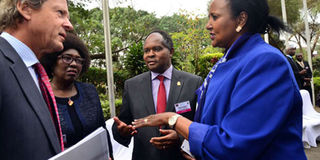Why African nations need keener focus on foreign policy issues

Kenya's Foreign Affairs minister Amina Mohamed and other guests during the opening of a WTO meeting on the greater Horn of Africa at the Intercontinental Hotel in Nairobi on August 28, 2017. Africa should develop keenness in foreign policy and international relations to realise long-term growth, Joel Okwemba argues. PHOTO | SALATON NJAU | NATION MEDIA GROUP
Kenya and almost all African states were created following a foreign policy decision of 13 European countries and the United States, led by the French, British and Germans. They were marking their spheres of influence during the Berlin Conference of 1884 (also referred to as the Congo Conference/West Africa Conference).
The conference, according to the General Act of the Berlin Conference, formalised the beginning of the Scramble for Africa and was motivated by these primary issues:
1. Freedom of trade in the basin of the Congo, its embouchures and circumjacent regions
2. End slave trade, and the operations by sea or land which furnish slaves to that trade
3. Neutrality of the territories comprised in the Conventional basin of the Congo
4. Navigation for the Congo and Niger rivers, their effluents and the waters in their system
5. Introducing into international relations certain uniform rules with reference to future occupations on the coast of the African Continent
KNOWLEDGE OF GLOBAL AFFAIRS
Considering this, Africa was not created by Africans nor for Africans. Driven by the Principle of Effectivity (establishment of authority) decisions made at Bismarck’s official residence in Wilhelmstrasse, Berlin, have shaped Africa’s international relations so far and likely in the future, unless a separate future is determined by a strong African leadership and a well-informed population.
It is not well researched as to what consumes the minds of the youth in Africa (who are currently the most talked about population on earth) when it comes to global affairs, since they are the most privileged generation, blessed with technological capabilities that can filter knowledge out of the information provided on the internet.
African governments and institutions could be apportioned blame when it comes to the ‘international political ignorance’ of the African minds on the world around them.
FOREIGN-LED GROWTH
It can cause a lot of worry when we have more Africa-specific research and academic institutions in Europe and America than on our continent, implying that there could be people who know more about Africa than Africans.
Another implication is that Africans could only be knowledgeable about Africa and not any other part of the world, owing to the lack of foreign-focused research and academic institutions across the continent.
The long-term consequence is that the continent’s growth will continue to be slow and foreign-led despite some recent commendable developments in expanding intra-Africa trade and infrastructure.
I hope that we can learn from the efforts of the pre-Berlin Conference era, and that all investments and growth should be led by proper research, organisation and planning. It is therefore high time that Africans developed full academic and non-academic organisations — state and/or non-state, not limited to examples like institutes for American Studies, Centres for Asian Affairs, Schools of European Affairs.
ROLE OF MEDIA
These efforts should be conscientiously matched with intra-Africa sub-regional focuses, which are non-existent or only brushed through as units, not concentrations, in international relations courses.
Closer to the people are the media, which deliberately or unintentionally are yet to improve the consciousness of the masses on these weighty issues. The foreign policies of African governments could easily go without much analysis or criticism from the people on the streets, apart from a few coincidences where the foreign media highlight issues resulting from the country’s decisions, global conferences hosted in African cities or headlines caused in other parts of the world and personalities.
Africa, as the cradle of mankind, should develop keenness in foreign policy and international relations to realise long-term growth in the security, economies and socio-political life of its people.
Mr Okwemba is the managing director of the Centre for International and Security Affairs, a Nairobi-based think tank.



